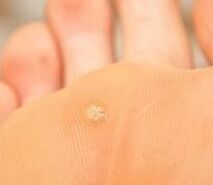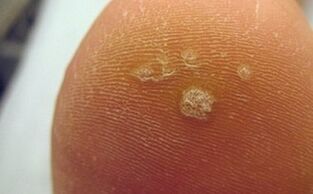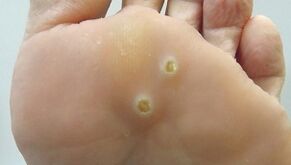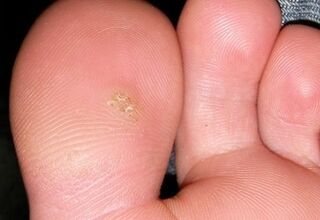
Plantar warts (plantar warts) are benign neoplasms caused by the human papillomavirus (HPV).They occur mainly in young people and do not pose a particular danger, because their degree of oncogenicity is too low.
However, it is better to consult a dermatologist to remove growths.Modern instrumental methods of excision of warts are much more effective than banal celandine and even surgical intervention, but they are used exclusively according to the doctor's prescription.
This therapy reduces the risk of recurrence of the pathological process to a minimum, and also prevents further rooting and proliferation of skin tumors on the soles of the feet.
Causes
A wart is a skin growth that is benign in nature.The appearance of the spine is caused by the penetration of the papilloma virus into the human body, of which there are about 100 types.
After entering the human body, HPV may not be detected for a long time, because it is in a "sleeping" state.But as soon as favorable conditions are created for it, it becomes active and immediately begins to multiply, affecting first the soft tissues and then the layers of the dermis, which sooner or later leads to the formation of warts.
The "dormant" state of HPV is due to:
- strong immunity;
- phagocytosis (a specific protective reaction that is activated when pathological agents penetrate the human body).
The risk of HPV infection depends on:
- the state in which the virus is in the body of an infected person;
- nature of contact (direct/indirect);
- the state of immunity of the HPV carrier.
People with a weak immune system are most susceptible to papillomatosis.But other factors can also affect the formation of plantar warts:
- constant stress;
- excessive work;
- non-compliance with hygiene rules;
- body exhaustion;
- uncomfortable or tight shoes;
- wounds, scratches, ulcers on the surface of the skin of the feet.
HPV can enter the human body through:
- using towels or other items belonging to a virus carrier;
- handling.
Factors that predispose to the formation of spines are:
- increased sweating of the feet;
- frequent contact with household chemicals (even if the laundry is well washed);
- injuries that lead to damage to the integrity of the skin of the legs;
- calluses, corns;
- endocrine and cardiovascular system diseases;
- use of non-sterile nail care tools;
- visiting public baths, saunas, swimming pools, beaches.

Human skin consists of several layers, namely:
- epidermis;
- dermis;
- subcutaneous fat tissue.
Once in the human body, the papillomavirus infects the basal layer of the epidermis (skin) and begins to actively reproduce.Cells affected by the papillomavirus gradually rise through all layers of the epidermis, eventually localizing on the stratum corneum of the epithelium.Thus, the skin becomes rough and keratinized, which creates a wart.
Symptoms
The incubation period lasts differently for each person.On average, it ranges from a few weeks to six months.During this time, the number of cells infected with the virus increases rapidly.But since the DNA gene of the type of HPV that causes plantar warts does not penetrate into the nuclei of cells, the risk of developing an oncological process is almost completely eliminated.
A plantar wart is a hard skin growth that has clear boundaries and an oval or round shape.The growth size ranges from 1-2 cm in diameter.The spine has a rod that goes deep into the layers of the dermis, and it is precisely this rod that causes discomfort and pain when walking.It protrudes above the surface of the skin by approximately 1-3 cm.In this case, the neoplasm can have a normal color or a light brown or pink shade.
In the initial stage of the formation of a skin growth, its surface is smooth, however, as it "ripens" it becomes rougher, due to which it becomes rough.Its hue becomes gray-yellow, and a crater-like depression may appear in the middle.The appearance of brown spots on the surface of plantar warts is also considered a common phenomenon.They appear as a result of the process of thrombosis of superficial capillaries in neoplasm tissues.
In most cases, plantar warts are single growths.However, in some situations, the formation of daughter spines is possible, which indicates excessive activity of the papillomavirus.A large number of neoplasms create a specific mosaic pattern on the skin area where they are localized, which is why they are also called "mosaic warts".
Sometimes the spine can go away on its own, without the need for treatment.At the same time, there is no trace in the place where the person is located.However, this is not common, as the foot is where the tumor is often injured.As a result, its self-destruction becomes almost impossible.On the contrary, it can constantly become inflamed, bleed and cause pain.
What plantar warts look like: photo

To understand what the spine looks like on the foot of an adult, you can look at the photo shown of a plantar wart.
Diagnostics
In most cases, no diagnostic procedures are necessary to diagnose plantar warts - the diagnosis is based on a dermatologist's visual examination of the area of the foot affected by growths.
However, if there is a need to choose a method for removing a skin tumor, a laboratory examination of a scraping taken from the surface of the spine may be necessary.
How to treat plantar warts: basic principles
Topical treatment is often sufficient to treat plantar warts.However, if the virus is too active and reaches the daughter's tumor, the doctor can prescribe systemic therapy based on the use of antiviral and immunomodulatory drugs.They help suppress the activity of the papillomavirus and strengthen the immune system, which in turn helps prevent HPV from penetrating deeper and damaging healthy parts of the skin.
However, preference is still given to local treatment, which not only removes the upper part of the spine, but also its axis.But it should be noted right away that the use of well-known folk remedies for warts is often not very successful, so it is still better to seek help from a dermatologist, undergo an examination and subsequent treatment.
The most effective and commonly used methods of treating plantar warts are:
- Chemical destruction.With the help of special drugs, skin tumors are cauterized, which leads to the complete destruction of their tissue structure.Treatment of the spine with the help of folk remedies is based on the cauterizing properties of certain plants and medicines.
- The use of cytostatics for local use.Products based on 5-fluorouracil, as well as ointments, have the greatest effect.
- Plantar wart freezing with liquid nitrogen.This procedure is called cryodestruction.With the help of a special device in which the necessary medicine is filled, the growth is frozen (exposure temperature reaches -220 ° C) and its subsequent removal.The manipulation is performed under local anesthesia and requires careful skin care after completion.
- Surgical intervention.In this case, they resort to the procedure of scraping the warts with a special medical device - a Volkmann spoon.It is possible to simply cut the spines with an ordinary scalpel, but this procedure has long been obsolete.
In addition to the manipulations described above, the removal of plantar warts is also carried out using modern instrumental techniques.Among them, the most popular are:
- Laser coagulation, which helps to get rid of skin growths in just 1 session.
- Electrocoagulation.Using a special electric scalpel, the spine is carefully removed.After the procedure, wounds and smaller scars may remain, so it is not used as often as laser coagulation.
- Radiowave removal of plantar warts.Manipulation is performed using ultrasound frequencies emitted by the drug.The procedure is popular as cryodestruction or laser coagulation.
- Ozone therapy.
Instrumental removal of plantar warts can be supplemented with local therapy, using drugs that have an antiviral effect.This combination of means helps to significantly reduce the risk of relapse of the pathological process, significantly increasing the overall effectiveness of the treatment.For this, the patient is prescribed ointments or subcutaneous injections of interferon, as well as applications.
Before using the drugs, a treatment is needed to soften the keratinized layer of the epidermis on the surface of the spine.For this purpose, keratolytics are used, which, however, do not remove the growth itself, so they are not suitable as an independent treatment for papillomatosis.You can use not only ointments - most often doctors recommend sticking blisters or bactericidal plasters.A few days are enough for the wart to soften, after which you can proceed directly to the main treatment.
Since the spine is prone to frequent inflammation, and the risk of secondary infection is too high, the patient may need to use antibacterial or anti-inflammatory drugs.However, in this case a special place is given to local treatment.
Laser removal of plantar warts
Today, laser coagulation is one of the most popular and effective instrumental methods for removing plantar warts.There are several types of carbon dioxide lasers that are used to destroy skin tumors.Thanks to this, a separate type of laser is used for each type of growth, which helps to completely squeeze out the wart and prevent its reappearance in the treated area.
The principle of the laser beam is simple.Due to high temperatures, fluids evaporate from plantar wart tissue, which leads to their necrosis.And although this process takes some time, laser coagulation allows you to remove unaesthetic and painful tumors in just 1 procedure.The main advantage of this technique is not even its high efficiency, but the almost complete absence of contraindications and side effects.The disadvantage is the high cost of the procedure, so not every patient will be able to afford it.
Only a qualified specialist - a dermatologist - can choose the optimal option for the removal of spines.He will also recommend how to prepare for the procedure and also tell you what measures to take to prevent the plantar wart from recurring.
Pharmacy finished products

If the plantar wart is not yet deeply rooted and hardened, it can be removed with ready-made solutions and ointments, which are freely available in pharmacies.Each product contains alkali or acid, so you must strictly follow the instructions for use of the selected drug.
A good remedy for spines is salicylic or boric acid, which is used in the form of ointments or applications.
Traditional medicine
The arsenal of traditional medicine also has many recipes that are very effective in the fight against various types of warts, including plantar warts.But it is not recommended to use them as independent drugs - in most cases they have to be combined with pharmaceutical drugs.
Here are the most effective recipes:
- Celandine juice.Perhaps this is one of the most popular and effective folk remedies used to treat various types of skin growths.The growths should only be treated with fresh juice 2-3 times a day until they disappear completely.
- Garlic juice.This drug has strong antiviral, bactericidal and anti-inflammatory effects.Before using for the treatment of plantar warts, the growth must first be scalded and slightly cut, then lubricated with garlic juice and wrapped in a bandage.Carry out the procedure daily.The course of treatment is 2-3 weeks.
- Acetic acid.To prepare the medicine, you need to soak the onion in acetic acid for 2-3 hours, then make a poultice and secure it with a bandage.Leave overnight.
- Pomegranate porridge.
However, the most effective remedy in the fight against warts is not drugs, nor the aforementioned recipes of traditional medicine, nor even modern instrumental methods for their removal, but a strong immune system.In people whose immune status has undergone positive changes, cases of spontaneous disappearance of skin tumors on the feet have been observed.
You can strengthen the immune system in several ways: sports, walking in the fresh air, proper nutrition, giving up bad habits, and finally special drugs - immunomodulators.Be that as it may, a stable and strong immune system is the key to absolute health of the whole body.
Prevention
Primary prevention of plantar warts is aimed at preventing HPV infection.For this you need:
- have individual footwear when visiting public pools, baths, saunas;
- use only your own towels and personal hygiene products;
- wear comfortable shoes;
- fight against foot sweating;
- treat all wounds, cracks and even minor scratches on the legs.
For the secondary prevention of plantar warts, it is necessary to strengthen the immune system by using antiviral and immunomodulatory drugs.It is necessary to start taking the medicines prescribed by the doctor to remove the skin tumor immediately after the procedure, which in itself is stressful for the body.
The therapeutic course must be completed to the end, because its interruption will bring all efforts to zero, so even a qualified specialist will not be able to eliminate the risk of re-formation of plantar warts.















